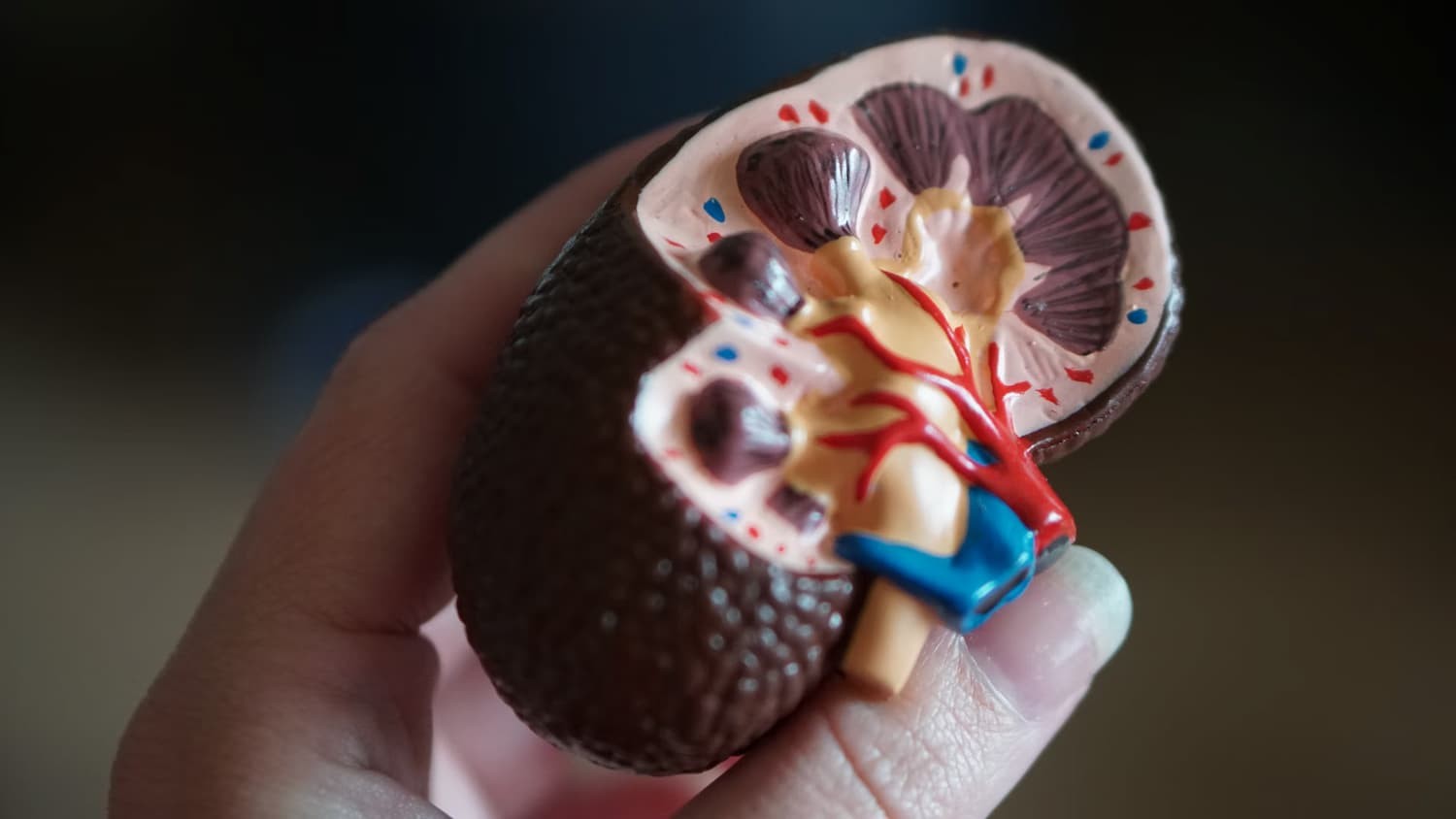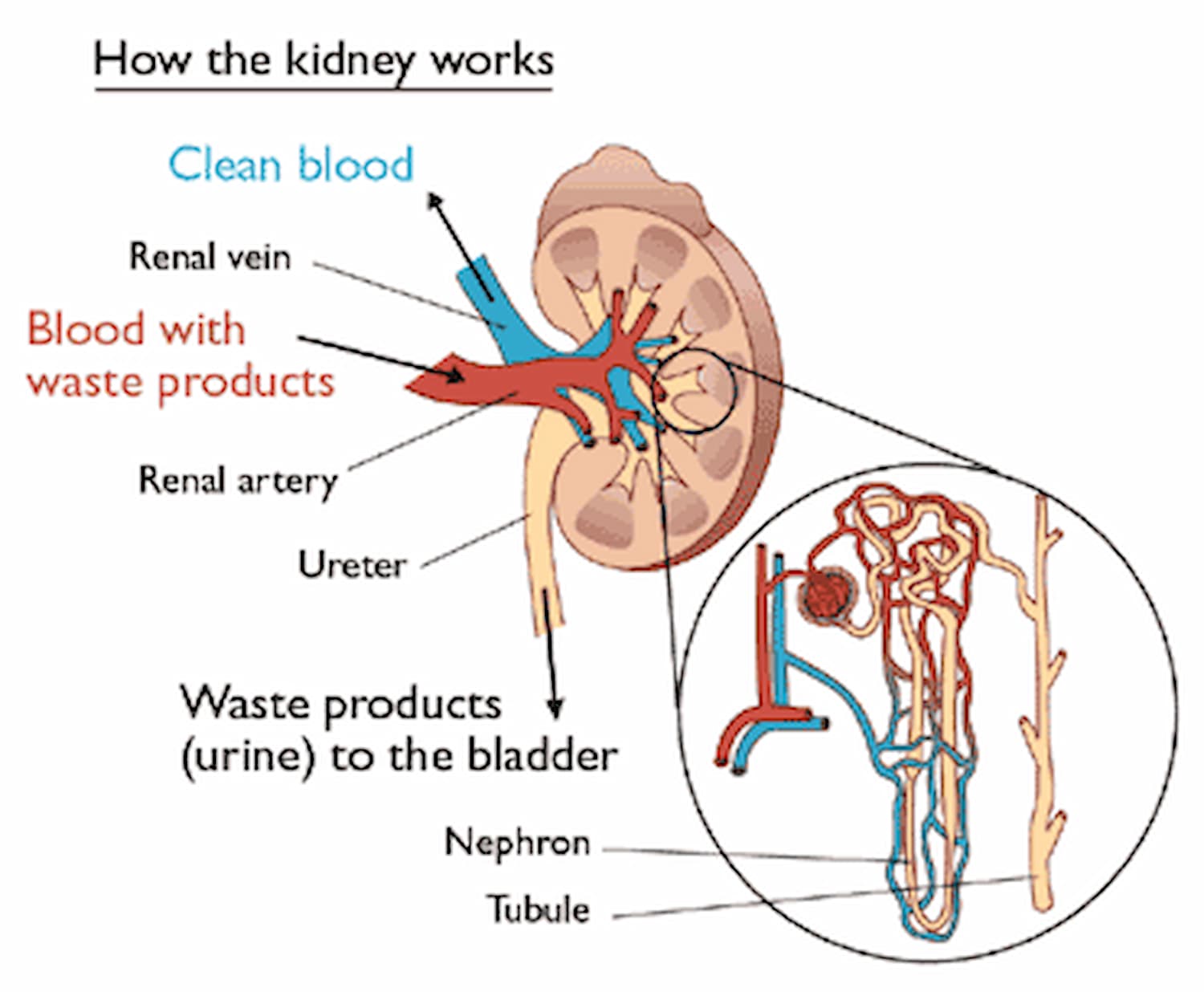
At the back of your body just below your rib cage are two bean-shaped organs about the size of your fist. These are your kidneys. The right kidney can be found below the liver while the left kidney lies below the spleen. The kidneys play a very important role in the human body as renal failure can lead to a host of health complications, including permanent kidney damage and cardiovascular disease.
Important Parts of the Kidneys
The function of the kidneys is mainly to filter your blood and remove excess water, salts and urea, which are then excreted as urine. Each kidney relies on two passageways that bring blood in and out of the kidney: the renal artery and the renal vein, respectively.
Inside each kidney are about a million nephrons. These are the hardworking filters of the kidneys. A nephron consists of a cup-shaped capsule (Bowman's capsule), a tube (renal tubule) and a bunch of blood vessels called glomerulus. The glomerulus filters your blood, while the tubular cells return essential substances to the blood while eliminating liquid waste. Both kidneys are equipped with a drainage tube called the ureter. This tube is attached to the back of the bladder.
How Your Kidneys Work
Your digestive system breaks down the food you eat into nutrients that are absorbed by your blood. Blood carrying food nutrients are first filtered by your kidneys before it re-enters the bloodstream, flows into the heart and is pumped throughout your body. To start the process of filtration, blood is transported to each of your kidneys through the renal artery.
Once blood enters a kidney, it is cleaned by tiny nephrons that make up your kidney. The nephrons strain deposits that are found in your blood so that only clean blood returns to your bloodstream through the renal vein. Waste products, excess minerals and water and other fluids leave the kidney as urine. Urine then passes the ureter on its way into the bladder where it is held until the bladder is full. When you feel the urge to pee, it is a sign that your bladder is full and you normally go to the bathroom to pass your urine.
Aside from acting as your blood's cleaner, your kidneys also regulate red blood cell production and the concentration and volume of blood that flows throughout your body. This is important for your body's other metabolic processes.

Source: UMICH
Ideally, kidneys that are in good working condition do not need extra help to do their jobs of filtering blood and fluids. But due to the introduction of toxins from bacterial infections, the food you eat, the water you drink, the personal products you use and the air you breathe, your kidneys may find it difficult to eliminate your body's waste products completely.
Certain health conditions such as diabetes and high blood pressure also affect the regular function of your kidneys. If you have diabetes, your high blood sugar levels may damage the nephrons that are primarily responsible for filtering blood. On the other hand, a high blood pressure can make it difficult for the kidneys to clean blood well. Decreased filtration may lead to kidney disease and in chronic cases, kidney failure. Some indications of kidney failure include swelling of the body, excess urea in the blood and a decrease in red blood cells.
Early detection is important to avoid kidney failure. Most symptoms of kidney disease go unnoticed until it becomes severe or chronic. As with most health problems, a nutritious diet, regular exercise, and a healthy lifestyle all help in preventing and treating kidney disease.
How to Keep Your Kidneys Healthy
The kidneys are particularly sensitive organs which require a diet low in sodium. A good rule of thumb is that if you wouldn't put it on your plate, then avoid putting it in your kidneys either. Your kidneys will thank you for avoiding the following:
- Soda is loaded with high levels of sugar or artificial sweeteners that put extra strain on kidneys.
- Coffee and tea have high levels of caffeine that increases urination, which can overly tax kidneys.
- Salt should be used in moderation because too much of it contributes towards fluid retention, raised blood pressure and kidney disease.
If salt and sugar are your kidneys' worst enemies, certain foods are their best allies, including:
- Cranberries can help lower uric acid levels, which prevents the formation of kidney stones.
- Kidney beans are high in protein and fibre which help maintain healthy kidneys through regular bowel movements.
- Dark green leafy vegetables like spinach contain antioxidants that contribute towards overall good health.
- Clean drinking water dilates the blood vessels, allowing blood to freely travel to your kidneys and transport essential nutrients while also allowing the organ to wash out waste products in a timely manner.
Aside from eating a healthy diet high in protein, fibre and antioxidants, regular exercise is essential to ensuring that your kidneys function properly for the rest of your life.
Originally published on Jun 09, 2009







